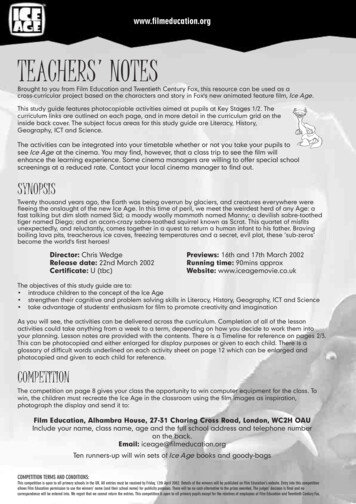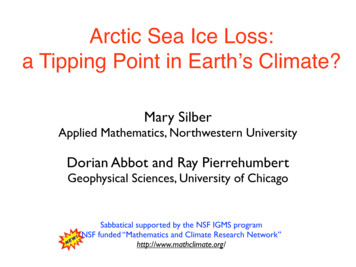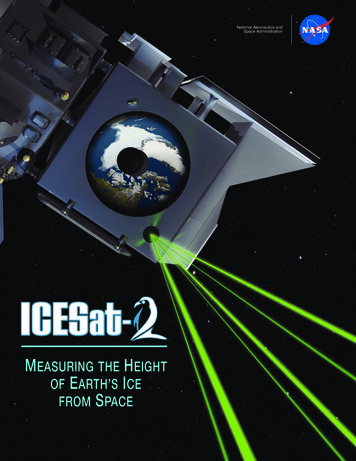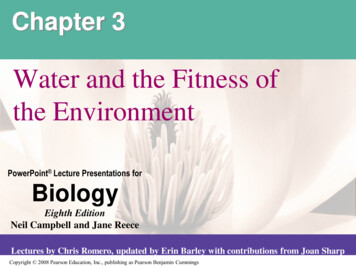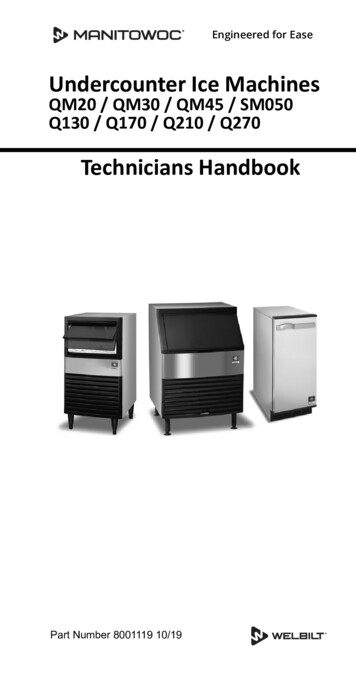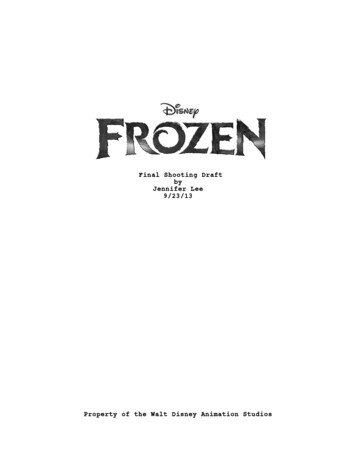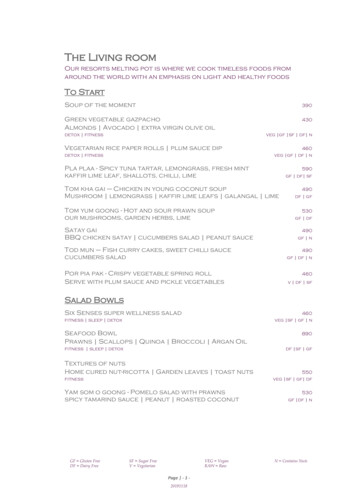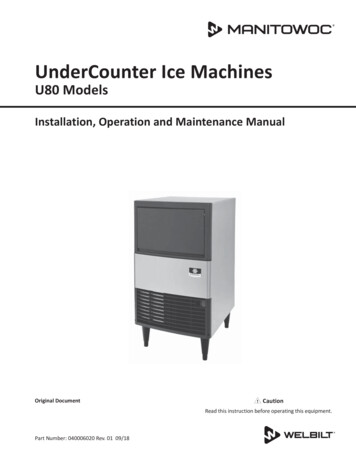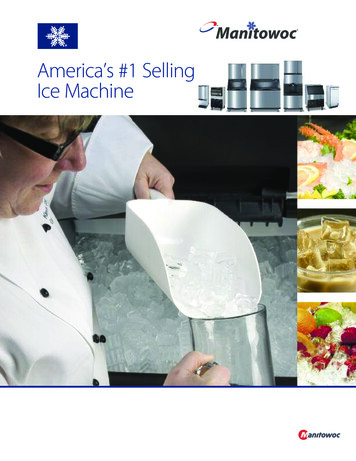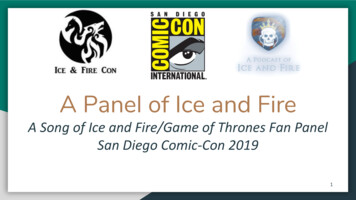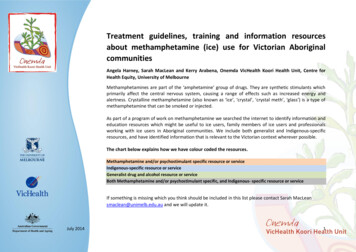
Transcription
Treatment guidelines, training and information resourcesabout methamphetamine (ice) use for Victorian AboriginalcommunitiesAngela Harney, Sarah MacLean and Kerry Arabena, Onemda VicHealth Koori Health Unit, Centre forHealth Equity, University of MelbourneMethamphetamines are part of the ‘amphetamine’ group of drugs. They are synthetic stimulants whichprimarily affect the central nervous system, causing a range of effects such as increased energy andalertness. Crystalline methamphetamine (also known as ‘ice’, ‘crystal’, ‘crystal meth’, ‘glass’) is a type ofmethamphetamine that can be smoked or injected.As part of a program of work on methamphetamine we searched the internet to identify information andeducation resources which might be useful to ice users, family members of ice users and professionalsworking with ice users in Aboriginal communities. We include both generalist and Indigenous-specificresources, and have identified information that is relevant to the Victorian context wherever possible.The chart below explains how we have colour coded the resources.Methamphetamine and/or psychostimulant specific resource or serviceIndigenous-specific resource or serviceGeneralist drug and alcohol resource or serviceBoth Methamphetamine and/or psychostimulant specific, and Indigenous- specific resource or serviceIf something is missing which you think should be included in this list please contact Sarah MacLeansmaclean@unimelb.edu.au and we will update it.July 20141
TREATMENT GUIDES & RESOURCESWhatHandbook for Aboriginal Alcoholand Drug WorkTreatment Approaches forUsers of Methamphetamine:A Practical Guide for FrontlineWorkersResponding to ChallengingSituations Related to the use ofPsychostimulants: A PracticalGuide for Frontline Workers.July 2014Who forAboutATSI AOD workers, mentalhealth workers and otherhealth professionalsThe handbook provides practical information forworking in the AOD field with a focus on ATSI clients.It includes a section on ‘stimulants’ (including ice),how to assess and help clients using meth andincludes advice on education and prevention.Aimed at all ‘frontline’ AODrelated workers (not just thosewith a clinical or professionalbackground.)Frontline workers who interactwith psychostimulant users including counsellors, casemanagers, support & healthworkers.Guidelines based on review of evidence and expertopinion. Includes emergency managementtechniques and a small section on ‘Specialconsiderations for Indigenous methamphetamineusers’Guide for workers based on best available research,national and international guidelines and expertopinion. Includes practical tips for reducing thelikelihood of challenging situations and respondingduring a crisis and considerations for different servicesettings such as needle syringe programs andcommunity health centres.LinksPDF available romotion-resources?lid 23503PDF available /drugstrategy/Publishing.nsf/content/idtremethPDF available D7ECA25764D0080C854/ File/chall.pdf2
Clinical Treatment Guidelinesfor Alcohol and Drug Clinicians:No 14. Methamphetaminedependence and treatmentAOD clinicians and servicesGuidelines to help clinicians and services developbetter clinical pathways and services that meet theneeds of methamphetamine users. Outlines bothacute and longer term interventions aiming toprovide key interventions to assist confidence andskill in managing methamphetamine relatedpresentations.Includes large section on AOD clinical tools andworksheets.A brief cognitive behaviouralintervention for regularamphetamine usersClinical practitioners andresearchersA guide detailing a brief intervention specificallydesigned for regular amphetamine users that may beutilised by practitioners working in a wide range oftreatment settings.PDF available D281BE85CA25789A0081D70F/ FILE/methdeptreat.pdfPDF and information available ng.nsf/Content/1DEA7F68576F8F16CA257BF0001F3E5C/ pubhlth-publicat-documentcognitive intervention-cnt.htmModels of intervention andcare for psychostimulantusers: Monograph Series No.51Clinical practitioners,researchers & policy makersComprehensive report on the pharmacology ofpsychostimulant drugs, their prevalence, risks andharms. Identifies best practice in detoxification andclinical interventions.PDF and information available ng.nsf/Content/5D6C43E1A64E3EE1CA257BF0001E8D5A/ document-mono51-cnt.htmJuly 20143
Fact sheet - Management ofpatient stimulant use for ageneral practice setting.July 2014GPsPDF available at:Brief fact sheet on assessment and management ofmethamphetamine and other stimulants for cal Resources/ForGPs.aspx4
TRAINING AND EDUCATION SUPPORTWhatWho ForAboutHealth professionals andcommunity educatorsA manual and CD-ROM to assist health professionalsand others, who want to provide current informationabout drug-related harms to people usingmethamphetamine and other stimulants. Themanual is divided into separate units to enable thefacilitator(s) to tailor their workshops to suit theiraudiences.Aware of AmphetamineAnex ‘ice –crystalmethamphetamine’ trainingprogramsJuly 2014People working in harmreduction, health & socialwelfare workers, generalcommunity supporting peoplewho use drugs.Anex provide training to a range of organisations andaudiences to help improve knowledge andconfidence in dealing with issues raised by ice use.Training courses can be tailored to specific audiencesand include: introduction to methamphetamine,tailored programs, ‘train-the-trainer’ programs andforums for community and professional groups. Theyhave provided community information sessions incollaboration with Victoria Police.LinksAvailable for -ofamphetamine.aspx?id ystal-methamphetamine-icetraining/5
WEBSITES, EDUCATIONAL & HEALTH PROMOTION RESOURCESWhatWho ForAboutLinksmeth.org.auMeth users, workers,family/friends of usersThis Australian website provides research-based,practical advice for self-managing some of the mostcommon meth-related issues, as well as options forspecialist treatment. Includes facts about meth, freetesting, resources for professionals and referralinformation.Links to the main site and to health th.org.au/index.php?id 32VACCHO and ADF ‘Ice takeseverything’ postersHealth and communityservices with Aboriginal clientsA series of ‘Ice’ posters developed byVictorian Aboriginal Community Controlled HealthOrganisation Incorporated (VACCHO) and theAustralian Drug Foundation (ADF) looking at the issueof Ice for the Koori community eg “Lost yoursistagirls, what’s next: Ice takes everything”To enquire about the posters, contact the Socialand Emotional Wellbeing team at VACCHOenquiries@vaccho.com.auPosters are currently available free of charge.Strong spirit strong mindprogram- pamphlets: Speed Mixing drugs is dangerous Injecting drug use- nevershare’July 2014Harm reduction informationfor Indigenous peopleThe WA Health department has produced a range ofresources for Aboriginal people, including pamphletsspecific to speed use which include information onwhat the effects of speed use and ways to reduceharms. Other relevant pamphlets include informationfor users on making and supporting change.For PDFs of pamphlets and information forordering ysecureresourcesforAboriginalpeople.aspxNote: lists some WA service contact numbers on backpage.6
ADAC – ‘Don’t mess with meth’comic and websiteSpeed: It’s your call - brochureIndigenous young peopleHarm reduction informationfor young Indigenous peopleWhat parents should knowabout Ice – PamphletParents and familiesADF pamphlets:Drug education, current methusers, support people andfamilies, Ice: How drugs affect you Amphetamines: how drugsaffect you Amphetamines and yourbodyNDARC Education Trust (NET) information booklets: Ice: fast facts On Ice A User's Guide to SpeedProduced by the Aboriginal Drug and Alcohol Council(SA) Inc. (ADAC). Website includes information aboutmethamphetamine and links to services. An onlinecomic about crystal meth provides culturallyappropriate information on the health and socialeffects methamphetamine /www.dontmesswithmeth.com/comic.phpThis Queensland Health brochure encourages youngAboriginal and Torres Strait Islander people to talk tosomeone and seek help if they can't stop usingspeed. It includes a checklist to find out if speed is aproblem and suggestions of ways to help stop usingspeed. Other Indigenous mental health andsubstance abuse resources are also available.Note: lists some QLD contact numbers.Pamphlet for parents provided by the VictorianDepartment of ls/cymhs factsheet.asp#factsheetsComprehensive and easy to read summaries ofhow methamphetamine affects your body and life.The ‘ice’ pamphlet includes harm reduction tips andhelp seeking ce-howdrugs-affect-you-(bundle-of-50).aspx?id 97ADF pamphlet sold in bundles of 50. Content can beviewed als/cymhs ocs/doc/C0D0E10F686B6EC6CA2578A3000951DE/ f50).aspx?id 85**See ADF bookshop for other relevant resources.General information for peoplewho may come into contactwith the drug;methamphetamine usersA range of booklets which include general ‘ice’information booklets, as well as a self-help guidefor people who use speed which includesstrategies for cutting down and quitting. BookletsOrder form and pdfs of urces/form.phpcan be viewed online and available at a cost.http://neteducate.org/index.php?p 2#res 33July 20147
Healthy Spirit HealthyCommunity: A Guide to Drugsand Alcohol within ourCommunityResource for communitymembers and healthprofessionals providinginformation about alcohol anddrugs including iceThis booklet by the Victorian Community ControlledHealth Organisation (VAACHO) and Australian DrugFoundation (ADF) - provides information aboutalcohol and drugs including iceNo shame no blame - familycomicAboriginal family members ofpeople with substance useissues. People working withAboriginal families.This comic is part of a set of resources developedunder the NSW Aboriginal Families and CarersTraining (AFACT) project titled 'No Shame, NoBlame!' – designed to assist Aboriginal families andcarers coping with the drug or alcohol problem of aloved one. The resources also include a workersguide and promotional poster, still available online.Booklet available at www.vaccho.com.auIce section of the booklet available athttp://www.druginfo.adf.org.au/attachments/1477 2014-05-27 ICE SPEED WEB screen.pdfPDF of comic and other afact comic.html dfNote: may include NSW service contact numbersYouth Drug and Alcohol Advice(YoDAA)Workers, young people., familyand carers, and schoolsProvides loads of information about drug use andservice availability for young people in Victoria.YoDAA also provides a link to a 24 hour advice line –see below.DrugInfo websiteAllDrugInfo offers a wide range of free resources aboutalcohol and other drugs.July g.au/8
SOME MAINSTREAM SERVICES AND SUPPORT GROUPSWhatWho ForAboutLinksAccess PointClients self-referring to CBTcounselling at Turning Pointcan make an appointment withAccess PointAccess Point is a service at Turning Point Drug andAlcohol Service in Fitzroy. It is for people who useamphetamine type stimulant drugs, includingmethamphetamine and cocaine and providessupportive counselling sessions based on a CBTmodel for clients to address their stimulant en - MethamphetaminePersonal Education ProgramMethamphetamine users whohave been placed on adiversion program or who areconcerned about theirmethamphetamine useA free 3 hour education program based on the bestcurrent evidence regarding methamphetamine useand treatment. The course provides an opportunityfor participants to reflect on the impact of meth useon their lives and those people around them;supports participants to develop strategiesassociated with various stages of behaviour change,including harm reduction, planning for change,getting through withdrawal and relapse preventionCrystal Meth AnonymousCrystal methamphetamineusersCrystal Meth Anonymous is a 12 step program andmethamphetamine-specific mutual support group.In Australia, these were first established in Sydney2005 but new meetings are commencing in St Kildaand Ballarat, VictoriaYouth Drug and Alcohol Advice(YoDAA)Workers, young people., familyand carers, and schoolsProvides loads of information about drug use andservice availability for young people in Victoria.July .au/1800 458 685 – 24 hour free advice9
Family Drug Support - supportservices and informationFamilies of substance users(not meth specific)A national support and information service with achapter in each state that provides family assistance24 hours a day. The website provides fact sheets anda range of coping tips and information to supportfamily members - e.g. ‘Dealing with Conflict’http://www.fds.org.auHelpline 1300 368 186.FDS produce a family education kit ‘A Guide ToCoping’ which includes information and strategiesfor families of drug users (avail via website)Family Drug HelpFamily members of substanceusersProvides family member support groups aroundVictoria, a telephone helpline and online support.Family counselling and courses.Counsellingonline.org.auFor drug users, familymembers and othersSupport is available using chat or messenger type ofinteraction, 24 hours a day, 7 days a week acrossAustraliaSMART RecoveryFor drug users, ex-usersSMART Recovery (Self Management And RecoveryTraining) are groups that combine mutual supportwith elements of cognitive behaviour therapy.Groups are not methamphetamine specific but arefor anyone wanting help managing their substanceuse or other addictive behavioursJuly m.au/10
comic and website Indigenous young people Produced by the Aboriginal Drug and Alcohol Council (SA) Inc. (ADAC). Website includes information about methamphetamine and links to services. An online comic about crystal meth provides culturally appropriate information on the health and social effects methamphetamine use.
